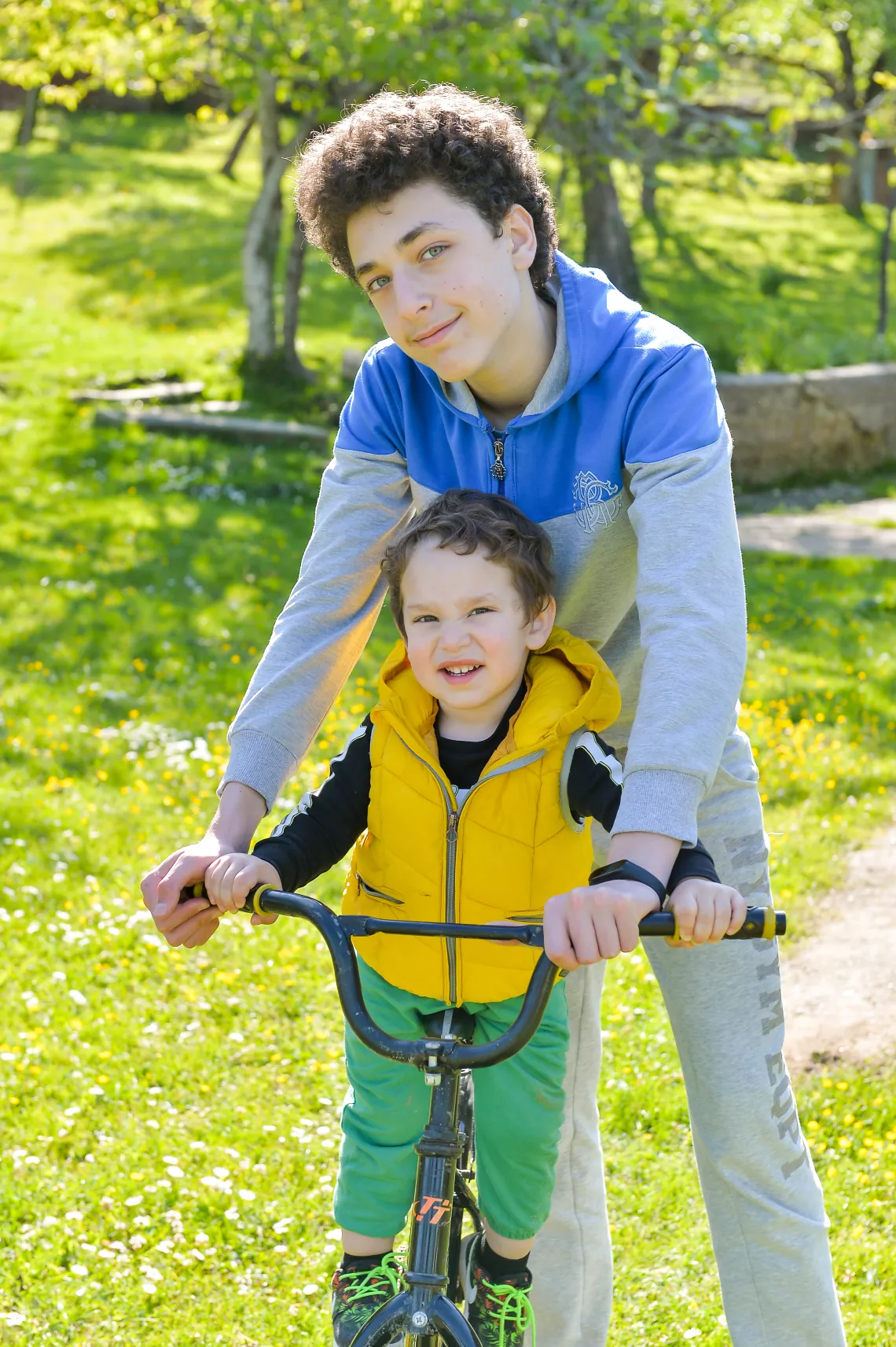How COVID-19 Changed Lives - Voices of Children
UNICEF Georgia asked children and young people around the country how they are coping with the new normal, and how their lives have been affected.

- Available in:
- English
- ქართული
Being a school student can sometimes be challenging, but the COVID-19 pandemic has made getting an education, and life in general, even more difficult for young people in Georgia.
With schools closed, lessons are being held remotely. All sports, school activities, and events have been cancelled. Friendships and relationships have been transported to live chats and video calls.
UNICEF Georgia asked children and young people around the country how they are coping with the new normal, and how their lives have been affected.
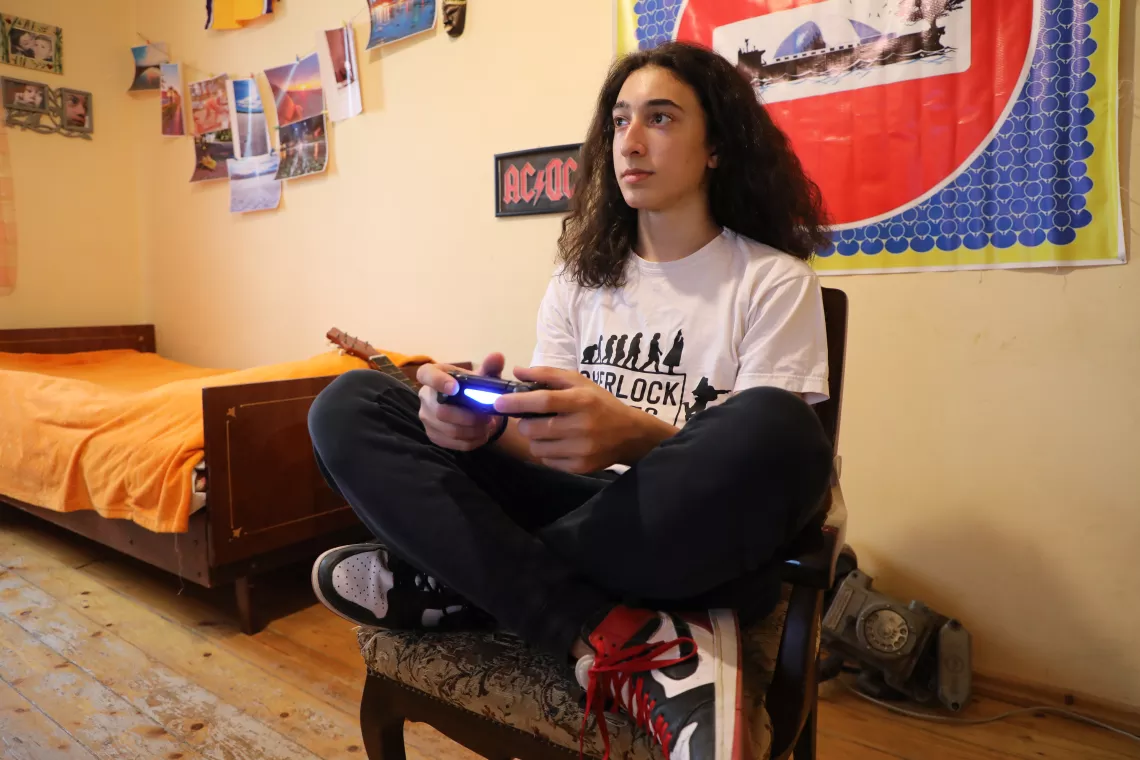
Mate Dvalishvili, 15 years old, Kutaisi
The COVID-19 pandemic has radically changed my life. When I used to go to school, by the end of the day I would be exhausted – mentally as well as physically – and as a result, I did not have trouble falling asleep. Now, I don’t get tired enough during the day, so I can’t sleep at night, and I wake up late in the morning. That’s why I am sometimes late for, or even miss, video classes.
Before, I used to wake up at 8 a.m., and by 9 a.m. I was already at school. After classes I went to a tutor, then to play sports. When I came home, I did homework and hung out with my friends, if we had free time. I went to bed sometime between 11 p.m. and midnight. Now, I get up at noon, or even as late as 1 or 2 p.m. When the weather is good, I may go out to ride my bicycle with my family members, but the rest of the time I’m at home playing online games and watching films. I go to bed at 1 or 2 a.m., and at times, I am video-chatting with my friends until 3 or 4 a.m., sometimes until morning.
The teachers are trying to teach our classes like they did in school, but still, I can’t say that online classes are as interesting as they were in person. At least now, I have a bit less homework to do. I was more active during classes while in school, there was more interaction. The programmes that we use for online classes cannot replace school. In order to make online learning effective, they should develop a special online programme that could be adapted to school teaching. At the same time, teachers should be familiar with using the programme.
For me, the hardest thing in the new reality is the new reality itself: doing nothing (for almost 2 months), and the immense lack of communication with my friends in real life. It is not unbearable, but it is very difficult.



Keta Tkhilaishvili, 10 years old, Batumi
My life has changed completely since my school was closed. Before, I spent most of the day at school with my classmates. Now, this is my free time.
When I went to school, my schedule was really full. I got up early, prepared for school, and I also had extra classes like German, chess, circle dancing, and so on.
Now my schedule is organized according to the self-isolation rules. I wake up at 10 a.m., I have breakfast, and then I have my online classes. I spend my free time as I wish, then I prepare my lessons. Sometimes I watch classes on TV. I am at home all the time. Since I have plenty of time now, I try to balance out working and free time on my own.
Interaction with my classmates in school is what I miss the most from before. When I went to school, I had more homework, but the lessons were way more engaging and interesting, I could concentrate better. Online schooling is something very new. At times, I struggle with online group studying because I don’t understand what the teacher is saying because of the Internet connection and other technical problems. But it’s interesting too. I learned how to do homework electronically and search for information on the Internet. Before, I thought that the Internet was only for playing and entertainment.
I want to go back to school soon, and before that happens, I want to be able to communicate on the Internet without interruptions.



Sandro Turabelidze, 11 years old, Village Jimastaro, Imereti
During the pandemic I had to switch to distance or online school. I don’t find learning online difficult, it is easy. Before the class is over, teachers give us an assignment, we do the homework, take a photo of the exercise book, and send it to the teacher. During the next lesson the teacher tests our knowledge. When I have free time, I play with my sister at home. I no longer visit my neighbors. I play by myself in the yard, I try to stay isolated. To spend time with my friends, I call them, we talk to each other, and play online. I go out to the yard for 5-10 minutes only, to play something by myself, like ride the bicycle, or play ball by myself, and then I go back inside as I try to avoid contact with neighbors.
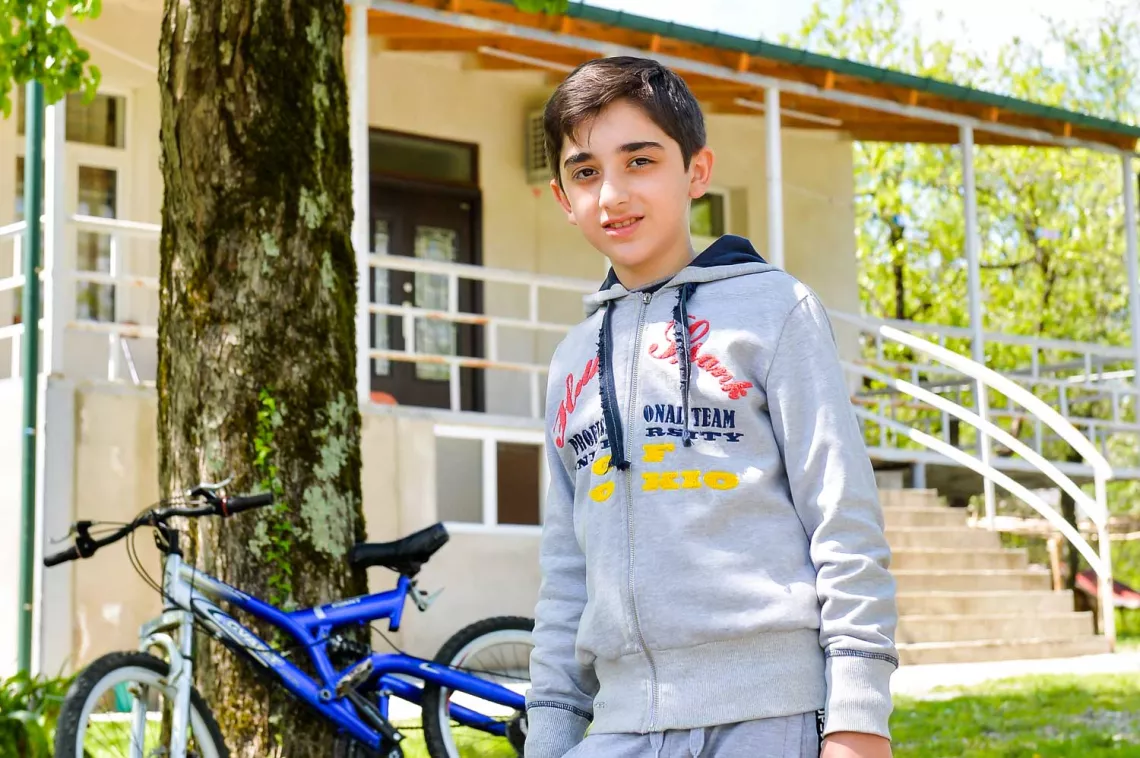
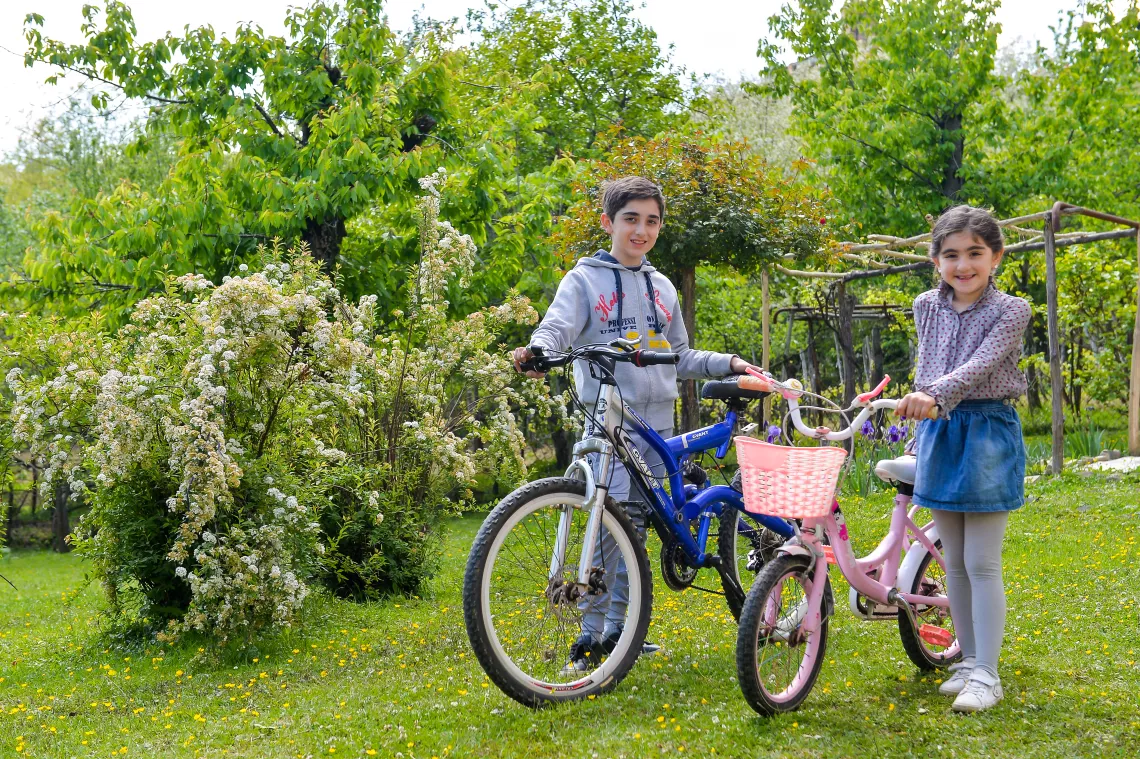

Elene Iashvili, 11 years old, Kvitiri
I live in the village of Kvitiri and I go to the Kutaisi Chess school. I had great plans this year. I was so excited to participate in the Georgia, Poti, Racha, and Tkibuli chess tournaments. Traveling around the country during tournaments is so much fun. We would go to the sea to relax after the game in Poti, and we would cozy up and enjoy the fresh air in the evening in Racha. In Tkibuli, we got to go to the swimming pool. Now, I play online chess games with a computer. Online chess tournaments are held for adults only. They are very rarely held for children my age. I also play with my grandfather, but it is very difficult for a child chess player to develop during quarantine.
I was very sad at the beginning, but my friends and I found a solution together. We created a chat and communicate via that chat very often. We named the chat “girls” but later we added boys to the group as well. These relationships are very helpful.
We became tied to our computers after the schools closed. Online classes can’t replace in-school classes. At school they explain the content in more detail. And also, many of my classmates can’t attend online classes. They may have the Internet, but don’t have a personal telephone or laptop. It would be unfair if they have problems because of this.
During self-isolation, I got interested in taking photos. I go out to the yard, take photos of the flowers. Now the strawberries have ripened. I try to take joyful photos to cheer up people who are locked inside. Having a relationship with nature is one way to keep spirits up.



Luka Turabelidze, 10 years old
I am in the fourth grade and have been studying online for 2 months now. Online learning is not hard at all.
I spend my free time riding my bicycle, and playing with my ball. I am lucky to have a yard, we don’t have to stay inside the house all the time. But, we don’t visit others and no one comes to visit us. That is why I am a bit bored. Also, I miss my classmates. I do talk to them on the phone, but meeting them and playing is a totally different thing. My mother and father are saying that the pandemic will go away soon and we will be able to live our lives like before. I hope that we will be able to go to the river and have a good time this summer.



Nana Samkharadze, mother of Tekla and Lile Machavariani
Tekla and Lile are having a good a time as possible during the pandemic. We try to keep up with their education – they are 4 and 5 years old – and we are teaching their age-specific skills as much as we can. We learn letters, numbers, addition and subtraction, and most of the time we play. We come up with different things. The girls have even made a small flower alley. The entire house is filled with their toys. So, we are having fun together and trying to make sure that the children do not feel the pandemic and its effects. It’s good that they have each other, they would probably be much more bored if they were alone.
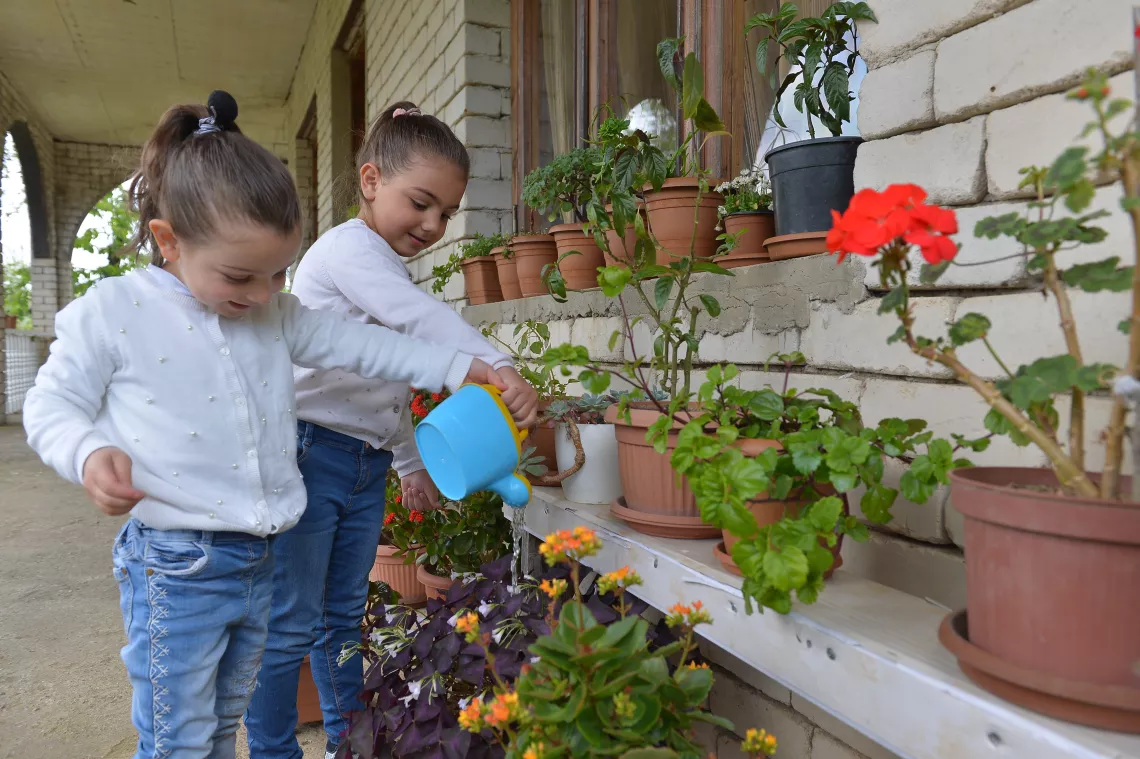


Giorgi Kapchelashvili, 17 years old, Kutaisi
The recent changes have affected me very deeply. Staying at home for such a long time is bad for one’s health. Most of the time I am on the computer. I miss real life communication with others a lot.
Before, I woke up at 8 a.m., now I wake up in the afternoon. I play on my phone while still in bed. Next, I have “breakfast” and again – telephone. The exception is the three days a week when online classes start at 10 a.m., and I have to wake up early.
I think one can receive a good education through distance learning, if willing. But real school was more interesting, because discussions with friends helped me to better understand the content. I love mathematics very much, and I miss going to the math teacher.
Although, I have found one upside – I’m in a band, I play an electric guitar. During this quarantine I have improved my playing technique considerably. I have also improved my English language skills. My sister is an English teacher and has helped me with my English.



Amiko Turabelidze, 12 years old
I love TV school programmes, and I watch them often. I personally like distance learning very much, because I have more free time. Now, I can spend more time riding my bike, drawing, and listening to music. I also help my grandfather in the vineyard. I communicate with friends on the Internet, but we cannot see one another and talk. I hope everything will be alright and we will see each other soon.

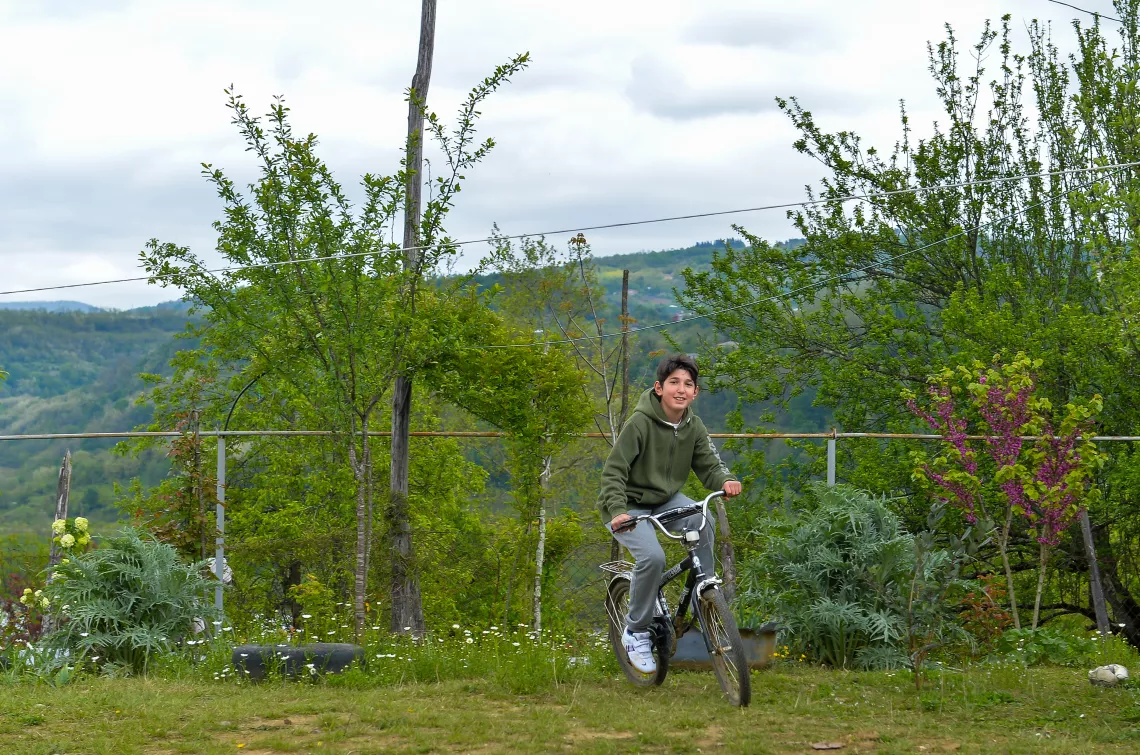
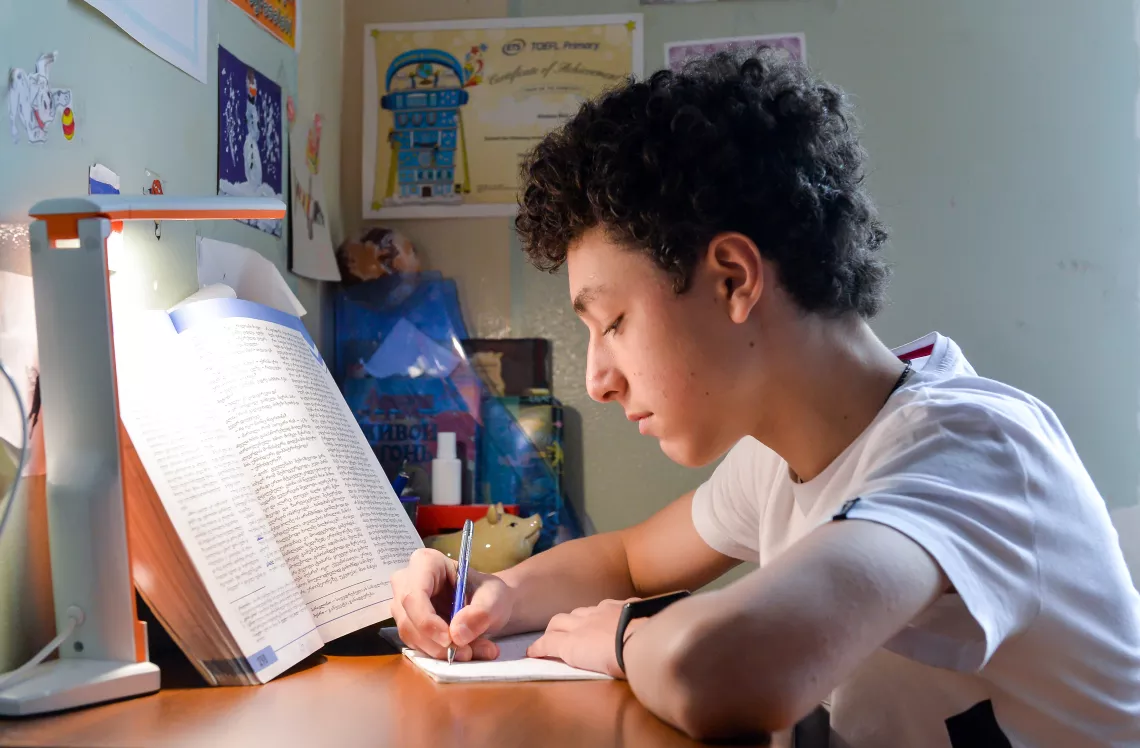
Nika Khelaia, 13 years old
Initially, I was afraid that online classes would be difficult, but it doesn’t seem as hard as I expected. In a way, it’s even easy. Currently, anatomy is the most interesting subject for me, because I am going to become a doctor, specifically, a surgeon. I usually take part in a lot of competitions, and I hope to be able to participate again starting in September.
I spend my free time with my brother, I ride my bicycle, and spend time outside. I have a younger brother – he’s 2 years old – and I try to keep him entertained. I give my parents a hand so that they have time for household chores.
